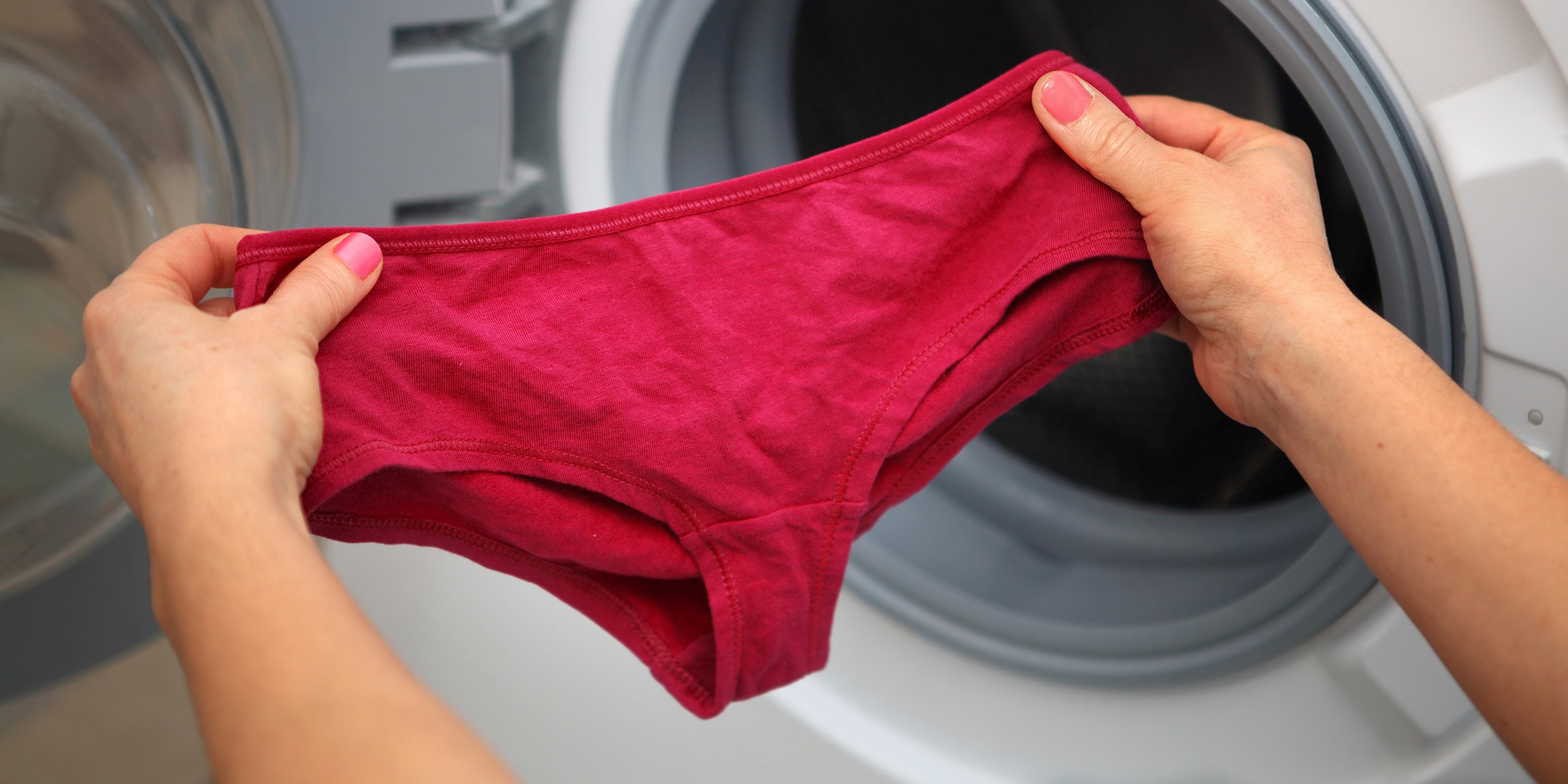Home>Women's Underwear>Swimwear>How Often Should You Wash Your Swimsuit


Swimwear
How Often Should You Wash Your Swimsuit
Modified: August 2, 2023
Discover how often you should wash your swimwear to keep it clean and fresh. Learn the best practices for maintaining your favorite swimsuits.
(Many of the links in this article redirect to a specific reviewed product. Your purchase of these products through affiliate links helps to generate commission for Under-tec.com, at no extra cost. Learn more)
Table of Contents
Introduction
When it comes to swimwear, proper care and maintenance are essential for keeping your swimsuits in top condition. After a refreshing swim in the pool or a relaxing day at the beach, it’s important to know how often you should wash your swimwear to ensure it remains clean, hygienic, and ready for your next aquatic adventure.
Washing your swimsuit regularly not only helps to remove chlorine, salt, sunscreen, and other impurities that can damage the fabric, but it also helps to maintain its vibrant colors and elasticity. Plus, who wants to put on a swimsuit that smells less than fresh?
But how often is too often? And what factors should you consider when determining the frequency of washing your swimwear? In this article, we will explore the importance of washing your swimsuits, discuss the factors to consider when determining how often to wash them, provide guidelines for proper washing techniques, highlight common mistakes to avoid, and share some tips to extend the lifespan of your swimwear.
Whether you’re a frequent swimmer or an occasional beachgoer, this article will equip you with all the knowledge you need to maintain your swimwear and ensure it stays in great condition, so you can make a splash with confidence every time you don your favorite swimsuit.
Importance of washing swimsuits
Regularly washing your swimsuits is crucial for maintaining their hygiene and prolonging their lifespan. Here are a few key reasons why washing your swimwear is so important:
- Removes bacteria and impurities: Swimsuits come into contact with various substances, such as sweat, oils, sunscreen, and pool chemicals. Failing to wash your swimwear can lead to the accumulation of bacteria and impurities, which can cause skin irritations and other health issues.
- Preserves colors and fabric: Chlorine, salt, and sun exposure can cause fading and damage to the fabric of your swimsuits. Regular washing helps to remove these substances, preserving the vibrant colors and elasticity of the material.
- Prevents odor: Let’s face it, no one wants to wear a smelly swimsuit. Washing your swimwear after each use helps to eliminate any odor-causing bacteria, ensuring that your swimsuits smell fresh and clean.
- Protects delicate embellishments: Many swimsuits feature delicate embellishments like beads, sequins, or tassels. Washing them with care helps to protect these details from getting damaged or falling off.
By understanding the importance of washing your swimsuits, you can prioritize their care and ensure that they stay in top condition for seasons to come.
Factors to consider when determining frequency of washing
The frequency at which you should wash your swimsuits depends on several factors. Here are some key considerations:
- Frequency of use: If you wear your swimsuit multiple times a week, it’s generally recommended to wash it after each use. This helps to remove any sweat, oils, or impurities that may have accumulated during your swim. If you wear your swimsuit less frequently, you can follow a schedule of washing it every few wears.
- Exposure to chlorine or saltwater: Chlorine and saltwater can be harsh on swimwear, causing fading and deterioration of the fabric. If you swim in chlorinated pools or spend time in salty ocean water, it’s important to wash your swimsuit promptly after each use to remove these damaging substances.
- Intensive activities: If you engage in activities like water sports, beach volleyball, or surfing, your swimsuit may be exposed to more dirt, sweat, or sunscreen. In such cases, it’s advisable to wash your swimsuit after every use to remove any potential stains or odor-causing bacteria.
- Environmental conditions: The temperature and humidity of your surroundings can impact the cleanliness of your swimsuit. If you’re in a hot and humid climate, where bacteria can grow more easily, washing your swimsuit more frequently is recommended.
- Type of fabric: Different swimsuit materials may require different washing frequencies. For example, delicate fabrics like silk or lace should be washed more gently and less frequently than more durable materials like nylon or polyester.
By considering these factors, you can determine the appropriate frequency for washing your swimsuits, ensuring they remain clean, fresh, and in optimal condition.
Guidelines for washing swimsuits
To keep your swimsuits looking their best, it’s important to follow proper washing guidelines. Here are some tips to help you wash your swimwear effectively:
- Read the care label: Before washing your swimsuit, check the care label for any specific instructions or recommendations from the manufacturer. This will ensure that you follow the appropriate guidelines for your particular swimsuit.
- Rinse after each use: After wearing your swimsuit, make sure to rinse it with cool water. This will help remove chlorine, salt, sunscreen, and other impurities that can damage the fabric if left to linger.
- Hand wash or gentle cycle: It’s generally best to hand wash your swimsuit using a mild detergent. If you prefer to use a washing machine, choose a gentle cycle with cold water to minimize any potential damage.
- Avoid harsh chemicals: Refrain from using bleach, fabric softener, or any harsh chemicals when washing your swimsuit. These can strip away the fabric’s elasticity and vibrant colors, causing it to lose its shape and charm.
- Avoid wringing or twisting: After washing, gently squeeze out the excess water from your swimsuit without wringing or twisting it. This will help preserve its shape and prevent stretching or damage to the fabric.
- Air dry: Allow your swimsuit to air dry by laying it flat on a clean towel or drying rack. Avoid direct sunlight, as prolonged exposure can cause fading. Never use a dryer, as the heat can shrink or distort the fabric.
- Store properly: After your swimsuit is completely dry, store it in a dry and cool place. Avoid folding or storing it in tight spaces to prevent creasing or damaging the fabric.
Remember, proper washing techniques are crucial for maintaining the quality and longevity of your swimsuits. By following these guidelines, you can ensure that your swimwear remains in excellent condition for many seasons of enjoyment.
Common mistakes to avoid when washing swimsuits
When it comes to washing swimsuits, there are some common mistakes that people make, unknowingly damaging their swimwear. By being aware of these mistakes, you can ensure that you are taking proper care of your swimsuits. Here are some common mistakes to avoid:
- Using hot water: Hot water can be too harsh on swimwear, causing the fabric to lose its elasticity and shape. Always opt for cool or cold water when washing your swimsuit to prevent damage.
- Washing with rough fabrics: Avoid washing your swimsuit with rough fabrics, such as towels or jeans, as they can cause friction and snag the delicate fabric of your swimwear. Instead, wash your swimsuit separately.
- Leaving swimsuits in wet bags: If you store your wet swimsuit in a bag for an extended period, it can promote the growth of bacteria and mold. Make sure to rinse and dry your swimsuit before storing it to keep it fresh and odor-free.
- Using excessive detergent: More detergent doesn’t necessarily mean cleaner swimwear. Using too much detergent can leave residue on the fabric, making it feel stiff or causing skin irritations. Follow the recommended amount or use a mild, gentle detergent.
- Skipping the rinse: After washing your swimsuit, it’s important to thoroughly rinse it to remove any soap or detergent residue. Residue left on the fabric can cause skin irritation and affect the swimsuit’s performance.
- Using the dryer: High heat from the dryer can damage the fabric of your swimsuit and cause it to shrink or lose its shape. Always air dry your swimsuit by laying it flat or hanging it up to maintain its quality.
- Ignoring care instructions: Each swimsuit may have specific care instructions from the manufacturer. Ignoring these instructions can lead to damage and a shorter lifespan for your swimwear. Always read and follow the care label.
By avoiding these common mistakes, you can ensure that your swimsuits stay in excellent condition and that you get the most out of your investment.
Tips for extending the lifespan of swimsuits
Swimsuits are an investment, and you want them to last as long as possible. By following these tips, you can extend the lifespan of your swimsuits and keep them looking great:
- Alternate your swimsuits: Instead of wearing the same swimsuit every day, rotate between multiple suits. This allows each swimsuit to have a chance to fully dry and regain its shape before being worn again.
- Pre-rinse your swimsuit: Before entering a pool or the ocean, consider pre-rinsing your swimsuit with clean water. This additional step helps to minimize the absorption of chlorine or saltwater, reducing potential damage.
- Avoid sitting on rough surfaces: Sitting on rough surfaces like concrete or rough pool tiles can cause snags or tears in your swimsuit fabric. Always use a towel or sit on a smooth surface to protect your swimwear.
- Limit contact with sunscreen: While sunscreen is important for protecting your skin, it can be damaging to your swimsuit fabric. Try applying sunscreen before putting on your swimsuit to minimize direct contact.
- Hand wash immediately: Whenever possible, hand wash your swimsuit immediately after use. This will help remove chlorine, salt, sweat, and sunscreen residue before they have a chance to set into the fabric.
- Avoid wringing: Never wring out your swimsuit to remove excess water. Gently squeeze or press it instead to avoid stretching or damaging the fabric.
- Use a swimsuit cleaner: Consider using a swimsuit cleaner specifically designed to remove chlorine and other impurities. These cleaners are formulated to be gentle on swimwear fabrics while effectively removing residue.
- Store properly: When not in use, store your swimsuits in a cool, dry place. Avoid folding them tightly or storing them in plastic bags, as this can cause creases or trap moisture, leading to mold or mildew growth.
- Take care with embellishments: If your swimsuit has any embellishments like beads or sequins, take extra care when washing and handling them. Hand wash or place the swimsuit in a mesh bag to protect the delicate details.
By implementing these tips, you can prolong the life of your swimsuits and enjoy them for many beach trips and pool days to come.
Conclusion
Proper care and maintenance are vital for keeping your swimsuits in excellent condition. Regularly washing your swimwear helps to remove impurities, bacteria, and chlorine, preserving the vibrant colors and elasticity of the fabric.
When determining the frequency of washing your swimsuits, consider factors such as frequency of use, exposure to chlorine or saltwater, intensity of activities, and the type of fabric. Following guidelines for washing, such as rinsing after each use, using mild detergent, and air drying, ensures that your swimsuits remain in optimal condition.
Avoid common mistakes like using hot water, washing with rough fabrics, or skipping the rinse, to prevent damage to your swimwear. Applying these tips will help extend the lifespan of your swimsuits, allowing you to enjoy them for many seasons.
Remember, taking care of your swimsuits not only maintains their hygiene and appearance but also ensures your comfort and confidence when wearing them. By incorporating these practices into your swimwear care routine, you can dive into your next swim with style and peace of mind.










